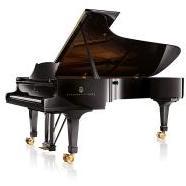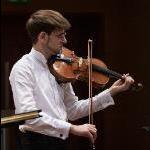Leaderboard
Popular Content
Showing content with the highest reputation on 01/23/2019 in all areas
-
@Theodore Servin I personally think Stanford is amazing. Check out his symphonies and Irish Rhapsodies for the full English Romantic orchestral treatment. For a tidbit of one of his finest pieces of church music, here's a fine performance of his "Beati quorum via" for 6-part mixed chorus a cappella with scrolling score: The first time I sang that motet as a young chorister, I wept for joy - no lie. Agreed about Rheinberger - an apt description indeed. One of my favourites of his is the "Abendlied" (Evening Song), again with scrolling score: If you get a chance to listen to these, let me know what you think! --Joe1 point
-
@J. Lee Graham I'm very glad to hear that! Now, I'm also interested in checking out more of Stanford, because I must confess, I have not listened to much of his music. I do like Rheinberger's music very much; very sophisticated and well thought-out music. I enjoy this kind of romantic music. Best, Theo1 point
-
@Theodore Servin Wow...your introductions make me want to get to know these guys better!1 point
-
Thank you responding, @J. Lee Graham! I suppose I should give some introductions to my list, as you have done with yours. Viktor Kosenko (1893-1938) was a Russian-born Ukrainian-Soviet composer and pianist. He wrote for almost every genre of music, including concertos and piano music. He is probably best known for his Passacaglia in G minor for piano, a magnificent work of epic proportions. Even though he was around during the Soviet era, he mostly wrote in a late-romantic manner. It's wonderful stuff to listen to. Toivo Kuula (1883-1918) was a Finnish composer. He wrote mostly songs and chamber music, and has an unfinished Stabat Mater. Personally, I love his massive Piano Trio in A major, particularly the 3rd movement. It's some very emotional and passionate music. Unfortunately, he was killed at age 34 from a scuffle with a drunken soldier at the end of the Finnish Civil War, from a gunshot wound to the head. Wilhelm Reinhard Berger (1861-1911) was a German composer, pianist and conductor. He was a very prolific composer, have completed over 100 opuses, although much of it remains unperformed. I consider his Piano Quintet in F minor to be among the best piano quintets ever written, and, like Kuula's Piano Trio, is a huge work, lasting roughly 50 minutes. A criminally underrated genius, in my opinion. Giuseppe Martucci (1856-1909) was an Italian composer, pianist, and conductor. He was the first Italian composer in decades (if not centuries) to not write an opera. His output includes 2 symphonies and piano concertos, and much chamber and piano music. It's very sophisticated music, and is definitely worth checking out. Vasily Kalinnikov (1866-1901) was a Russian composer. His life was a tragic one, to say the least, having been impoverished most of his life, and dying at aged 34 from tuberculosis. Probably his best known works are his 2 symphonies, both of a fresh and magical quality, with touches of Russian nationalism incorporated in the music. Wladyslaw Zelenski (1837-1921) was a Polish composer, pianist and organist. If at all, he is probably best known for his chamber music, including his Piano Quartet in C minor, an excellent work, that I would highly recommend to any chamber music-lover.1 point
-
Thank you! @J. Lee Graham actually the only reason I started the fughetta in c major was that I wanted to begin with 2nd violin and I thought F major would be either too low or too high. This forced me to insert these four bars (91 - 94) which don't sound good to my ears, but I didn't know what to do :/ @Theodore Servin Thanks! the piece was performed by me and my friends but unfortunately I don't have a recording1 point
-
Yes, I agree that people should stick to their studies and just do what they're told if it comes to that, because honestly nobody can stop you from writing whatever you want to write on your free time and after you finish studying. Nobody can really brainwash you to write stuff you think is horrible, you can of course just lie to yourself, but that's 100% on you. Hell, I've been writing neoclassical stuff in the last five years or so, despite most of my output (MOST, I actually wrote my first neoclassical sonata for piano DURING my composition study, along with other stuff that was way more "out there") during my study time being very modern and crazy (and fun!) You need to be smart about things, be good at all styles, learn all techniques, learn all you can and use all you can use as often as you can and get stuff performed, no matter what it is, as often as you can. That's why you study somewhere, that's why you go through all that effort. If you're just going to hide and be like "I don't like modern music boo hoo D:" then studying composition at a conservatory is really not something for you. I'd rather have that space saved for people who actually can appreciate an education that goes into all sorts of styles and pushes them to do things that may make them uncomfortable or force them to think outside of their comfort zones. In other words, people who actually want to grow and improve.1 point
-
Thanks for these ideas - there are some that I would never have thought about but work well and that I like! It's sad to hear that you couldn't finish your degree. I am thinking about studying composition at RCS but I do not know what style the professors are most comfortable with - hopefully not just experimental/contemporary! You started writing at about the same time I did, although you have been composing for longer. This is a wonderful site, where "young" composers can meet experienced ones like yourself to share ideas and make pieces better. It's been a pleasure working with you to improve not just this piece, but my ways of reviewing and criticising my own music - for this is the only real way I can improve. Thank you very, very much for you time and your suggestions, they mean so much to an aspiring composer like myself. Thanks again. Scott1 point
-
Theodore, thanks for your list, I will check it, I really appreciate that. Yes in fact, nowadays, tonal music is not well considered in the academic circles, I started the bachelor of composition some years ago, and despite I had a scholarship, I decided to abandon the bachelor due the pressures of some teachers asking me for a change in my creative orientation.1 point
-
Thank you for all the comments, Is a pleasure share with you my works1 point
-
Interesting. I'm often sceptical of such studies as my first question is what they seek to achieve in practical terms. Some application is fairly obvious but trying to understand the perception of music is always going to be fraught with problems. Whether you attempt analysis with scientific method or the softer approach of semiotics you hit problems straight away as you're dealing with individuals. And if there's one thing that psychology can't get at it's an individual's raw data, having to rely on anecdote and social norms and things. Even phsyiological psychology still has to treat the individual as a "black box". I did read the papers and had comments on both which would take rather a lot of space to list. #1 raised more questions than answers: narrow, relying on music attempting to communicate emotions (and fairly basic emotions at that) - not all music aims to communicate emotion. It speaks of universality but I think we already knew of that. An aficionado of Far Eastern or African music will be well aware of these regions incorporating western styles particularly in popular music. It probably appeared in the Far East thanks to interest in "classical music" (particularly Japan but also Hong Kong) brought in a century ago when these countries opened up to the west. In Africa probably through colonisation. Japan created westernised orchestras across the last century, sent its music students to Germany, France, the UK and the States. [Edit]My far and away favourite Bruckner conductor was Japanese (alas now deceased). The second paper interested me in that it extended questions raised in Die Reihe, a series of periodicals from the 1950s but addressed more by musicians than scientists but who were nonetheless engaged in all aspects of the avant garde. Even so, Eimert did an excellent piece in Vol 6 Sprache und Musik, about information theory and communication - bordering on what became semiotics. It's the source of my interest in semiotics. However, semiotic research re music is probably wasted effort. Although music does contain quasi-linguistic elements they're too vague and the cultural/philosophical pressures external to the music itself are in themselves complex. So trying to relate sign to signified will never be more than hypothesis. More in the line of philosophy and what reality is about? I noticed both papers emanated from Germany. What we need now is research into whether and how symbolist music communicates a mood/picture. Does that have universality? An interesting topic.1 point
-
Well, here's an interesting discussion. Would that they were not so rare these days! To answer the original question, most (but not all) of my music falls within an immediately identifiable historical style. Within the fairly narrow confines of that style, I invariably try to do certain things differently and uniquely according to my own sensibilities, while remaining as faithful to the style as possible - creating something new with old tools, as it were. I've been told this gives much of my historicist music a flavour that is uniquely my own, and I would like to believe this is true. It is certainly something I continually strive for on some level as I compose. There would be little value to my self-expression in this manner were there nothing about it that is mine, and mine alone. That said, it is not of paramount importance to me that my personal expression is as unmistakable as that of Beethoven, for example, only that I have been at once true to the historical style in which I am writing, and to my own artistic sensibilities. Likewise, in my "modern" voice, I follow the dictates of my own sensibilities in hopes that what results is something that is my own unique expression.1 point
-
Well this is an interesting discussion, @Ken320. I'm sorry to have missed it when it was new. When I started writing 'concert music' or whatever a few years ago, I was writing in what I now understand to be a terrible perversion of the Classical style. This is mainly because I had just fallen in love with that style (cuz that's what they play on classical radio stations). Since then, most of my scraggy has taken on a more Romantic or Impressionist style (though still pretty mangled), with wider-ranging techniques. It's kind of ludicrous for me to say my music has a distinct voice, since there's so little of it altogether and my grasp of theory and orchestration is still ... in development. My audience is so miniscule that I doubt any of this matters (yet, I hope). To the point made by @Monarcheon, I'm certainly guilty of stealing techniques from things I hear and read about online. I suspect most of us are, whether that's from a website or a classroom. I think the challenge is using these techniques well and responsibly. Polychords, secundal clusters and stacks of fifths all play into my latest piece because I read about them on one website or another. I do try to fit them into places where they make sense aesthetically or dramatically. To be fair, though, the entire history of music is full of people making subtle adaptations or innovations to the existing body of music theory, and borrowing the rest from those who've come before. I think the current conception of artists and composers as solitary geniuses who must offer radically original works (or be considered worthless) is a relatively new concept in the history of art and music. I think in the past, there was a lot more admiration of technical mastery over pure originality. I'm interested to hear others' takes on this, though.1 point
-
Two lovely pieces! Ländler in D : You definitely capture an elegant spirit and the melodies flow well. I could imagine dancers easily! I think this one is a better Ländler. Ländler in G : The 1st theme is very nice but seems less danceable than the former. That said, it is more musically substantial and has greater potential concert value. From both of them, I can see your knowledge about dance music and the spirit behind the Ländler. I think they would be better if I was to see dancers, but you've done a nice job!1 point




